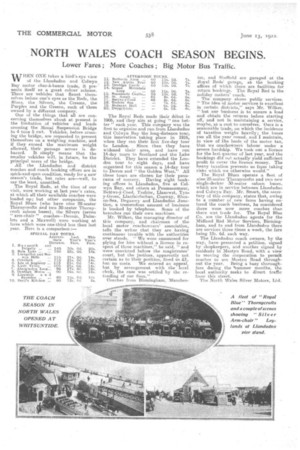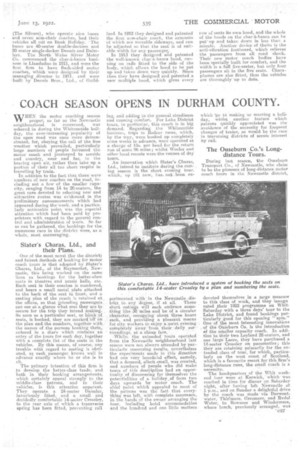NORTH WALES COACH SEASON BEGINS.
Page 24

Page 25

If you've noticed an error in this article please click here to report it so we can fix it.
Lower Fares ; More Coaches ; Big Motor Bus Traffic.
WIIEN ONE takes a bird's-eye view of the Llandudno and Colwyn Bay motor char-à-banes trade, it presents itself as a great colour scheme. There are vehicles that flaunt themselves before one's eyes as the Reds, the Blues, the Silvers, the Creams, the Purples and the Greens, each of them owned by a different company.
One of the things that au are concerning themselves about at present is the limitation of vehicles anl loads crossing the Menai Suspension Bridge to 4 tons 5 cwt. Vehicles, before crossing the bridge, are requested to present themselves on a weighing machine, and if they exceed the maximum weight allowed, their passage across is de barred, It simply means that the smaller vehicles will, in future, be the principal users of the bridge. All the Llandudno and district coaches and coach booking offices are in spick-and-span condition, ready for a new season's trade, but rates are-well, to say the least, unsettled.
The Royal Reds, at the time of our visit, were working at last year's rates, at which all their available coaches were loaded up; but other companies, the Royal Blues (who have nine 28-seater Thornycrofts and two 30-seater Thornycroft saloon buses), the Silvers (seven " arm-chair " coaches-Dennis, Daimlers and a Maxwell) were working at Fares which were one-third less than last year. Here is a comparison : The Royal Reds made their debut in 1906, and they aim at going "one better " each year. This company was the first to organize and run from Llandudno and Colwyn Bay the long-distance tour, this innovation taking place in 1916, when they ran their first five-day tour to London. Since then they have widened their area, and have run 14-day tours to Scotland and the Lake District. They have extended the London tour to eight days, and have organized for this season a 14-day tour to Devon and "the Golden West." All these tours are chosen for their panorama of scenery. Haying eight booking offices in Llandudno, five at Colwyn Bay, and others at Penmaenmaur, Bettws-y-Coed, Trefriw, Llanrwst, Tyny-Groes, Llanfairfechan, Conway, Rhoson-Sea, Deganwy and Llandudno Junction, a tremendous amount of business is booked by telephone. Some of the branches run their own machines.
Mr. Wilkes, the managing director of this company, and chairman of the local motor coachowners' association, tells the writer that they are having continuous trouble with the authorities over stands. " We were summoned for plying for hire without a licence in respect of three machines," he said, " and were convicted before the magistrates' court, but the justices, apparently not certain as to their position, fined us £1,
but no costs. We entered an appeal, but by arrangement with the local clerk, the case was settled by the refunding of our fines."
Coaches from Birmingham, Manches
ter, and Sheffield are garaged at the Royal Reds: garage, at the booking offices of which there are facilities for return bookings, The Royal Red is the noliday makers' coach.
The company shuns public services. " The idea of motor services is excellent in certain districts," says Mr. Wilkes, " but our business is to ensure a. load and obtain the returns before starting off, and not in maintaining a service, maybe, at a cost to ourselves. Ours is a seasonable trade, on which the incidence of taxation weighs heavily; the buses run all the year round, and I maintain, in view of the basis_ of the motor tax, that we coachowners labour under a severe hardship. We took out a licence for the last quarter of last year, and the
bookings did notactually yield sufficient profit to cover the licence money. The heavy taxation prevents us frpm taking risks which we otherwise would."
The Royal Blues operate a fleet of nine 28-seater Thornyerofts and two new single-decker 30-seater saloon buses, which are in service between Llandudno and Colwyn Bay. Mr. Smart, the secre tary of this company, states that, owing to a number of new firms having entered the coach business, he considered there were now more coaches than there was trade for. The Royal Blue Co. are the Llandudno agents for the Midland Red Motor Services, Birmingham, and to and from Llandudno there are services three times a week, the fare being 12s. 6d. each way.
The Llandudno coach owners by the way-, have presented a petition, signed
by shopkeepers, and another signed by residents in Mostyn Road, with a view to moving the corporation to permit coaches to use Mostyrt Road throughout the year. Being a busy thoroughfare during the °summer months, the local authority seeks to divert traffic from this street, The North Wales Silver Motors, Ltd. (The Silvers), who operate nine buses and seven arm-chair coaches, had their vehicles all out on Bank Holiday. The buses are 40-seater double-deckers and 20-seater single-decker Dennis and Daimlers. The North Wales Silver Motor Co. commenced the char-A-bancs business in Llandudno in 1911, and were the first firm to have flush-sided motor coaches, which were designed by their managing director in 1911, and were 'built by Dennis Bros., Ltd., of Guild ford. In 1912 they designed and patented the first, arm-chair coach, the armrests of which are movable sideways, and can he adjusted an that the seat is of suitable width for any passenger. In 1913 they designed and patented the well-known char-h-banes hood, running on rails fitted to the side of the body, which allows the hood to be put up and taken down very quickly. Since then they have designed and patented a new multiple hood, which gives every
row of seats its own hood, and the whole of the hoods on the char--banes can be put` up and taken down in less than a minute. Another device of theirs is the anti-vibration footboard, which relieves the passengers from all road shock. Their new motor coach bodies have been specially built for comfort, and the width is a full five-seater, but. only four passengers sit in the five seats. t harephones are also fitted, thus the vehicles are thoroughly -up to date.


































